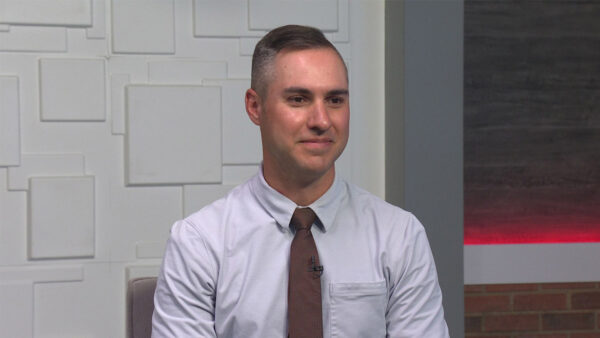The U.S. government is now accepting applications for Deferred Action status from certain young illegal immigrants who were brought to America as children. Individuals who are granted Deferred Action status are protected from deportation for two years, and are eligible for employment authorization. Immigration attorney Regina Jefferies talks about the program and an executive order by Governor Jan Brewer denying driver licenses and other public benefits to Deferred Action grantees.
Ted Simons: Good evening. Welcome to "Arizona Horizon." I'm Ted Simons. Last week the federal government began accepting applications for a program that temporarily protects certain childhood immigrants from deportation. The deferred action program also gives these immigrants an opportunity to seek employment authorization. Soon after the program was announced Governor Brewer issued an executive order stating that deferred action status does not qualify individuals for a drivers license and other state services. Here to share her views on all this is immigration attorney Regina Jeffries, who chairs the Arizona chapter of the American Immigration Lawyers Association. Good to see you again. Thanks for joining us.
Regina Jefferies: Thank you.
Ted Simons: Let's define terms. Deferred action status. Who can apply?
Regina Jefferies: Under the president's new program the individuals that can apply are individuals that might otherwise be known as dreamers so they were brought to the U.S. before the age of 16, they have been present in the U.S. at least the last five years, they haven't been convicted of a felony or other significant crime and they have graduated from school. They have graduated from high school or are currently enrolled in school.
Ted Simons: How do they get the applications? Correct me if I'm wrong, they get one shot at this and one shot only, correct?
Regina Jefferies: That's right. That is a great point. This is a one-shot deal. You don't get an appeal. You have to make sure the application is correct when you send it in and that you have sufficient supporting evidence. It's absolutely critical that it be done right the first time. The forms are actually available online at the Immigration Services website and that's www.USCIS.gov. You shouldn't be paying for forms. Forms are free. They can be gotten on that website. Individuals can fill them out from there.
Ted Simons: What if someone fails? Is that immediate deportation? What happens here?
Regina Jefferies: Not necessarily. If you have someone that may have a criminal issue or another red flag, the best advice that I can give those individuals is to absolutely speak to a reputable licensed attorney prior to applying or a BIA (Board of Immigration Appeals Accredited Representative. They need to be seeking legal advice before filing anything. Someone that falls within the enforcement priorities of the immigration service, like someone with a serious criminal history, that could ultimately end them up in a deportation proceeding. However, for the vast majority of individuals who will be applying for this program, they will not be placed in a deportation proceeding if their application is denied.
Ted Simons: How about a time frame here? How long before deferment is granted and who decides whether or not that deferment is granted?
Regina Jefferies: That's the million dollar question. The Immigration Services are saying they will attempt to have these application adjudicated within about four months. Typically it takes three months to adjudicate the work permit application as well. The total we're hoping will be around four months. The individuals that will be adjudicating the vast majority of the cases are immigration service officials.
Ted Simons: Okay. Eligible for employment authorization? Is that just a long way of saying work permits?
Regina Jefferies: That is, yes, you could say it as work permitted. It is absolutely a work permit. It place as person in an authorized period of stay, so they are allowed to be in the United States to work and with that work permit which is a valid form of federal photo identification are allowed to get a Social Security card as well.
Ted Simons: I want to talk about the Governor's executive order. Because it seems to me if you have a work permit in Arizona you can apply for and receive a driver's license. Her executive order says no drivers license to these folks. What's going on here?
Regina Jefferies: Well, unfortunately the governor, maybe unfortunately for her, the Governor's order conflicts with state law. Arizona state law is really clear on this point that if someone can provide an Employment Authorization document and Social Security card they are eligible to receive an Arizona state driver's license. The language of the statute is very clear saying someone who is lawfully present or within an authorized period of stay can receive a driver's license and that's what these individuals have, an authorized period of stay. They don't have legal status, but they are in an authorized period of stay.
Ted Simons: What is Motor Vehicles Division going to do about this? Do we know?
Regina Jefferies: To be honest I'm not sure. I think there's a lot of confusion out there and I think this is one of the main things. It's going to be very difficult for them to do what they need to do because on the one hand they are required to follow Arizona state law and the Governor's order does not comport with Arizona state law or regulations. I think it's going to have to be something that will have to be resolved in the courts.
Ted Simons: There are other public benefits involving this executive order. What does that involve?
Regina Jefferies: Things like in-state tuition. I believe the governor's order makes reference to things like snap or food stamp benefits, but to be honest none of these individuals would have otherwise qualified for those benefits under either federal or state law.
Ted Simons: Obviously busy time for you. A lot of folks have a lot of questions and concerns. What are you hearing the most from people that you're in contact with, the dreamers, if you will? What are their biggest concerns?
Regina Jefferies: One of the main questions is, is it still worth it to go forward and do my Employment Authorization application and my Deferred Action application even though I can't get a driver's license? And I think for the vast majority the answer is yes. The state doesn't have any control over whether the federal government is going to issue employment authorization or whether the federal government issues a Social Security card. Those two things are really critical for these individuals who really want to continue to be productive citizens and to continue to expand their own horizons and do the things they couldn't otherwise do.
Ted Simons: Are you hearing a bit of fear regarding the fact that folks that may have been bouncing around in the shadows, moving from one shadow to another, are being asked and perhaps considering coming out from those shadows for a two-year trial period, are you hearing some concern about that? That would change an awful lot of folks in a lot of ways.
Regina Jefferies: Honestly, no. The vast majority of individuals that I speak with are ready to come forward and to take the step. They recognize that even though this isn't a permanent solution or anything, they do recognize that it's a benefit that they wouldn't otherwise be able to get. They are ready to step forward because honestly, they could be picked up at any time otherwise. So it's a risk one way or the other.
Ted Simons: You gave a website to address earlier in the program. Give that address again and talk to us about the fact that you can go here for information. You don't have to go to folks who want money for information.
Regina Jefferies: Right. Well, the immigration service is WWW.USCIS.gov. That's the official source of information for this program. It's a great source of information. There are also reputable immigration attorneys and other individuals that are out there that are providing the service to people. So especially for someone with a problem area potentially or someone that's not really sure if they meet the requirements it's a good idea to speak to an attorney. Attorneys typically charge. The better option is to go and speak to someone to make sure of your qualifications rather than to take the chance and maybe get denied.
Ted Simons: But watch out for scams out there.
Regina Jefferies: Watch out for scams. Definitely.
Ted Simons: All right, well it is good to have you here. Good information. We are going to run a little piece with more information on who actually is eligible for this particular program. Thanks for joining us on "Arizona Horizon."
Regina Jefferies: Thank you for having me.
(Deferred Action Video)
Regina Jefferies:Immigration Attorney;























